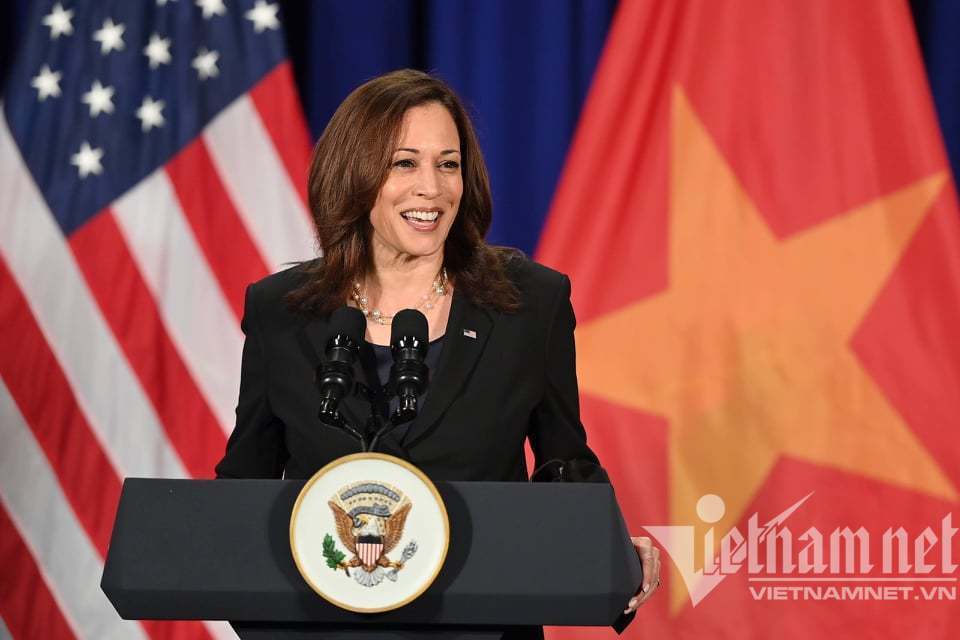 |
|
Inside a Ford’s plant in the northern province of Hai Duong.
|
There is plenty of room for Viet Nam to lure investment from the United States especially after the visit of US Vice President Kamala Harris to Ha Noi in late August, said Nguyen Van Toan, Vice Chairman of the Association of Foreign Investment Enterprises.
Online newspaper congthuong.vn cited Toan as saying that during her visit, Vice President Kamala Harris said that the US Government would continue to promote bilateral co-operation with Viet Nam on economy, trade and science and technology.
Over recent years, many US investors visited Viet Nam to learn about the country's investment environment, Toan said, mentioning a large amount of US investment into Viet Nam via a third country.
According to the Ministry of Planning and Investment's Foreign Investment Agency (FIA), there remained untapped opportunities for Viet Nam and the US to cement and then foster two-way co-operation.
The strength of US investors in finance, advanced technology, international markets and good business administration skills were in line with Vietnamese policies on investment attraction with focuses on projects in the fields of hi-tech industries, R&D and projects which could help Vietnamese enterprises deeply participate in the value chain; promote the digital economy and actively contribute to ensuring national sustainable socio-economic development, according to the FIA.
In order to attract investment projects from the US, Viet Nam should continue to improve its macro-economy, control inflation, and speed up administrative reform in order to better facilitate US investors, experts have said.
They said it was necessary for the Viet Nam to co-ordinate with the US in researching and developing specific policies on FDI attraction, especially from multinational companies with strengths in capital, technology, management capacities, research and development, competitiveness and market penetration.
In the near future, the country could lure investment from US multinational companies in two ways, including implementing large, high-tech projects for exports and creating the right conditions for multinational companies to build R&D centres, as well as technology incubators associated with human resource training in Viet Nam, experts said.
They also emphasised the importance of hosting conferences seeking US investment in fields that the US had advantages such as finance and banking, energy, hi-tech, infrastructure, supporting industries, processing and manufacturing.
The US is currently ranked 11th out of 141 countries and territories investing in Viet Nam, the latest data from the Ministry of Planning and Investment showed.
As of August 20, 2021, US investors had 1,122 valid projects in Viet Nam, with total registered capital of US$9.7 billion.
Among 18 sectors luring US investment, accommodation and catering services took the lead with 24 projects worth more than $4.2 billion, or accounting for 44.1 per cent of total US investment capital in Viet Nam.
Processing and manufacturing came next with 383 projects, valued at over $3.1 billion or equivalent to 32 per cent of the total investment capital. It was followed by water supply and waste treatment, transport and warehousing which made up 5.4 per cent and 4 per cent of the total US investment, respectively.
The US-invested projects mainly focused on the southern localities with the most dynamic economic development and favourable infrastructure conditions such as Ba Ria-Vung Tau; HCM City and Binh Duong. In which, Ba Ria-Vung Tau led with 19 projects capitalised at $4.6 billion, accounting for 47.6 per cent of total US investment capital registered in Viet Nam.
Meanwhile, as of August 2021, Vietnamese enterprises also poured $1.06 billion into 204 projects in the US. Their investments mainly were in science and technology with 10 projects valued at about $342 million or accounting for 32.3 per cent of total investment capital. Other sectors were real estate with 17.3 per cent; and processing and manufacturing with 12.8 per cent.
Deals in airline industry
On September 21 (local time), Viet Nam's budget carrier Vietjet inked a contract to provide aircraft and engine maintenance service worth $260 million with CFM International during the ongoing working trip of Vietnamese President Nguyen Xuan Phuc to the US.
The contract has lifted the total value of co-operation deals between the two sides to $18.5 billion.
With a long-term strategic partnership, Vietjet and CFM International - a joint venture between General Electric (GE) and Safran would continue to team up in the management of engine maintenance services, engine technology transfer and engineer training towards the goal of turning Viet Nam into a centre for aircraft repair and maintenance in the region.
CFM International is one of the world's leading engine suppliers. It is also the main supplier for Vietjet's fleet which has nearly 100 of the most modern aircraft in the world flying on many domestic and international routes.
The strategic cooperation relationship between Vietjet and CFM International has contributed to promoting the bilateral trade relations between Viet Nam and the US and efforts towards balanced bilateral trade.
The same day also witnessed an agreement worth nearly $2 billion signed between Bamboo Airways and the General Electric’s GE Aviation in New York.
Under the deal, the airline would purchase GENx engines, which will be delivered next year, to power its Boeing 787-9 Dreamliner aircraft and a maintenance package for its Boeing 787-9 fleet.
The fleet would be used on planned non-stop routes between Viet Nam and the US.
If conditions permit, the flight service would begin in early 2022 with three weekly flights initially. Given the market demand, the capacity could increase to five or seven flights per week.
Source: VNS

America has returned to Southeast Asia
With the official visit to Singapore and Vietnam of US Vice President Kamala Harris, the White House has sent a message to Southeast Asia. It is “America is back” in a region that plays an increasingly important role in US strategy.